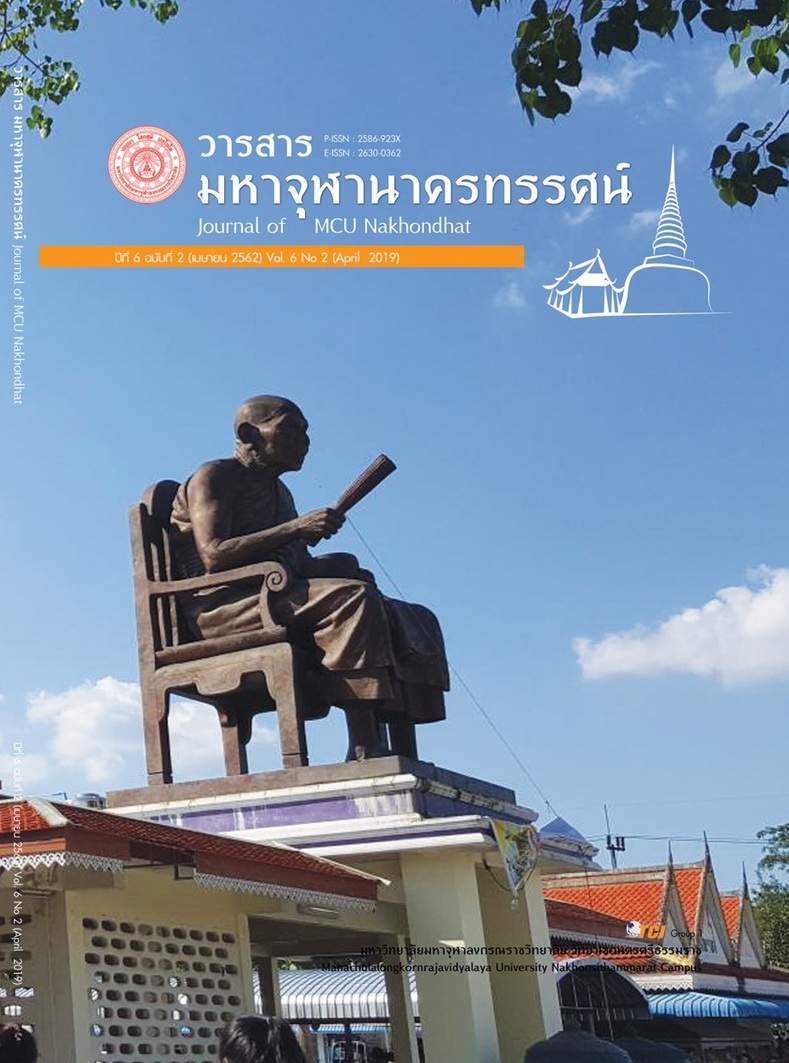THE ETHICAL APPLICATION OF ALTRUISM IN RECONSTRUCTING THE VALUEOF MUNICIPALITY BUDGETING FOR DEVELOPING THE SUSTAINABLE COMMUNITIES.
Main Article Content
Abstract
The objectives of this research were: 1) to study the concept of the value of municipality budgeting, especially the case study of Muang Saraburi municipality. 2) To study the altruistic ethic as the tool of this research. 3) To apply the altruistic ethic in reconstructing the value of municipality budgeting for developing the sustainable communities, and 4) to create new body of knowledge and model of the value municipality and other departments based on using the altruistic ethic. This study was the qualitative research by methodology in dialectic method and also using the discursive reasoning under the process of analytic, appreciative and applicative approaches to contribute effective model in the Philosophical and Religious field.
The results of research were found as follows:
- The problems of the value municipality budgeting in the Muang Saraburi municipality such as 1) the behaviors of persons concerning with the municipality budgeting which the right and proper doing are or not. 2) Those behaviors can be managed how to be effected the value municipality budgeting. 3) For developing the sustainable communities, those behaviors to perform how those behaviors should be performed in the result of the expenditure budgeting of municipality.
- The altruistic ethic is concerned with the reconstruction of the value municipality budgeting such as 1) Western altruistic ethic consisting of Socrates, Plato and Aristotle’s Intellectualism, Utilitarianism of Jeremy Bentham and John Stuart Mill, Deontologism of Immanuel Kant and the principle of Good Governance. 2) Easter altruistic ethic consisting of Buddhist ethics and Philosophy of Sufficiency Economy.
- To apply the altruistic ethic in the behavior modification of officials for effecting in reconstructing the municipality budgeting for developing the sustainable communities.
- To create new body of knowledge by including the use of postmodern paradigm as the guideline of the municipality budgeting based upon the modification of mindset, behavior and procedure of persons concerning with budgeting by the upstream, midstream and downstream of process integrated with the powers of adaptivity, creativity, collaborativity and requisitivity. To select the best way of the municipality budgeting, it should be maintained by law, orders and should be fulfilled by the principle of saving, transparency, performance and profit for people. The good officials should be practised in the code of conduct. Also, for eventually leading to joyous benefits of people in communities occurred from the municipality budgeting, it should use the postmodern philosophical paradigm by the Royal initiated Develop mental principals of His Majesty Rama IV of understanding, achieving and developing focus on the concept of searching for co-existence ideology, respecting different views, participating in reconciliatory dialogue leading to reconstruct the stable, prosperous and sustainable communities.
Article Details
References
ขนิฏฐา กาญจนรังษีนนท์ และคณะ. (2554). โครงการวิจัยประโยชน์สุขจากเศรษฐกิจพอเพียง. ใน รายงานวิจัย (หน้า 69). กรุงเทพมหานคร: กองทุนสนับสนุนการวิจัย (สกว.).
พระมหาประทีป สิริปญฺโญ. (2558). การศึกษาวิเคราะห์หน้าที่ทางศีลธรรมของค้านท์ตามทัศนะของพุทธปรัชญาเถรวาท. ใน วิทยานิพนธ์พุทธศาสตรมหาบัณฑิต สาขาวิชาปรัชญา (หน้า 22). บัณฑิตวิทยาลัย มหาวิทยาลัยมหาจุฬาลงกรณราชวิทยาลัย.
ราชบัณฑิตยสถาน. (2554). พจนานุกรมฉบับราชบัณฑิตยสถาน พ.ศ. 2554. กรุงเทพมหานคร: อักษรเจริญทัศน์.
วิทย์ วิศทเวทย์. (2532). จริยศาสตร์เบื้องต้น : มนุษย์กับปัญหาจริยธรรม. กรุงเทพมหานคร: อักษรเจริญทัศน์.
วิรัช วิรัชนิภาวรรณ. (2552). การบริหารจัดการของหน่วยงานของรัฐ : การวิเคราะห์เปรียบเทียบตัวชี้วัด. กรุงเทพมหานคร : สำนักพิมพ์โฟร์เพซ.
สุวิทย์ เมษินทรีย์. (2560). ปรัชญาของเศรษฐกิจพอเพียงและการพัฒนาที่ยั่งยืน : กระบวนทัศน์การพัฒนาสู่ประเทศไทย 4.0. กรุงเทพมหานคร: สถาบันบัณฑิตพัฒนบริหารศาสตร์.
สวัสดิ์ อโณทัย. (มกราคม-มิถุนายน 2558). วิธีการสร้างความสุขตามปรัชญาเศรษฐกิจพอเพียง. วารสารเซนต์จอห์น, ปีที่ 18 (ฉบับที่ 22).


